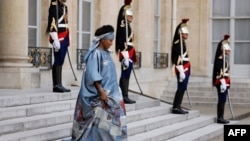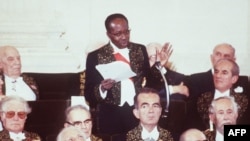He ran on a “break” platform, advocating for greater sovereignty for his homeland – including withdrawing from the West African CFA Franc Monetary Union, the African financial community created by France nearly a century ago.
The shock victory of Senegal’s new President Basilou Diomaille Faye has been closely watched in Paris, amid growing questions about what the results will mean for France’s relationship with its former West African colony.
Will a Faye presidency fuel anti-French sentiment, or a rise in the influence of other foreign powers? Will this further weaken France’s economic and military presence in West Africa – Paris has already withdrawn troops from coup countries such as Mali, Burkina Faso and Niger?
Or, as critics suggest, does it re-emphasize that France’s relationship with its former colonies must be rethought and reset – a process that some add is already well underway?
France’s influential Le Monde newspaper wrote that the election of the anti-establishment Faye “is a wake-up call for Western countries such as France, which are now competing with many other powerful countries.” Today, Paris and other countries “must learn from the consequences of the current African context, which increasingly looks like a new stage in the long history of decolonization.”
More win-win
In both Paris and Dakar, the first official reaction was positive. President Macron’s office said the French leader called Faye after his election and “warmly” congratulated him, adding that France hoped to “continue and strengthen” bilateral relations.
Faye insisted that Senegal would remain a “certain and trustworthy ally”, saying Dakar’s partnership with Paris was “the right thing” but “must be revisited”.
“We need to win more from this,” Faye told France Info radio in a recent interview, adding, “We have been saying this for years but unfortunately no one listens to us.”
France’s relationship with its former colony – once the oldest in sub-Saharan Africa – has historically been close, albeit occasionally bumpy.
The country’s first president, author and politician Leopold Sédar Senghor, studied in France. His second wife, Colette, was from Normandy. After leaving office, Senghor became the first black member of France’s prestigious literary institution, the Académie de France.
Until recently, France was Senegal’s main economic partner, and Macron developed a good relationship with Faye’s predecessor, Macky Sall.
But as elsewhere in Francophone Africa, anti-French sentiment is rising, especially among young people. “France degage” or “French out” are common slogans at demonstrations. On X, some people were happy after reading the fake news that Faye asked France to leave the country. “Long live Senegal, free from France,” one commentator wrote.
Ousmane Sonko, Faye’s influential opposition ally, is one of the critics of France’s alleged excessive influence in Senegal. While Sonko’s rhetoric has softened in recent months, both men have called for greater national sovereignty over resources such as oil and fisheries.
Not everyone is bashing France, however. In Paris, Mamadou, a Senegalese businessman who sells berets and Eiffel Tower keychains to tourists, is content with the status quo. “We have a stable relationship,” Mamadou said of the two countries. “Our relationship goes way back.”
reduced presence
While France remains a major investor in Senegal – French bakeries such as Paul’s and supermarket chain Auchan dot the capital Dakar – its footprint has shrunk dramatically in the decades since Senegal gained independence in 1960. Other countries have also stepped in.
Beijing is now Dakar’s largest trading partner. A Saudi company built the capital’s new airport, which is now managed by a company mainly controlled by Turkey. American, British and Australian companies are involved in oil and gas extraction in Senegal. European, Turkish and Chinese industrial vessels are sucking fish off their shores, hitting artisanal fishing industries and exacerbating hunger and migration.
Meanwhile, non-francophone countries Nigeria, Angola and South Africa have become Paris’ main trading partners in sub-Saharan Africa.
Denis Castaing, the former head of France’s development agency in Senegal, wrote in French newspaper France: “It is easy to make speeches about Senegal’s ‘sovereignty’ but not to take measures against France’s presence in Senegal at independence. It’s difficult.” Opinion.fr website.
Some critics are also skeptical that Faye will bring about major upheaval — at least not anytime soon.
The presidency of Burkina Faso’s President Fay would not be “a revolution that breaks everything, but a more moderate position.” parga observer the newspaper wrote in an editorial.
For example, Senegalese analyst Pape Ibrahim Kane similarly predicts that it will take time for Faye to deliver on his promise to leave the CFA and switch to a West African currency called Eco.
“Maybe in a year, a year and a half, we will know better,” he told French broadcaster RFI.
But on the other hand, change may come faster. There are reports that Macron wants to further reduce France’s already reduced military presence in West Africa, including Senegal, where France has about 350 armed forces personnel. Calling on Paris to close its last two bases in Senegal could be an easy victory for the new Faye government, Kane said.
“From a symbolic perspective, I think it will show how [Dakar] “We are regaining Senegalese sovereignty without too many consequences,” said Senegalese analyst Kane. “The French themselves are already rethinking their military presence on the continent – so this could happen very quickly.”
Follow us on Google news ,Twitter , and Join Whatsapp Group of thelocalreport.in

